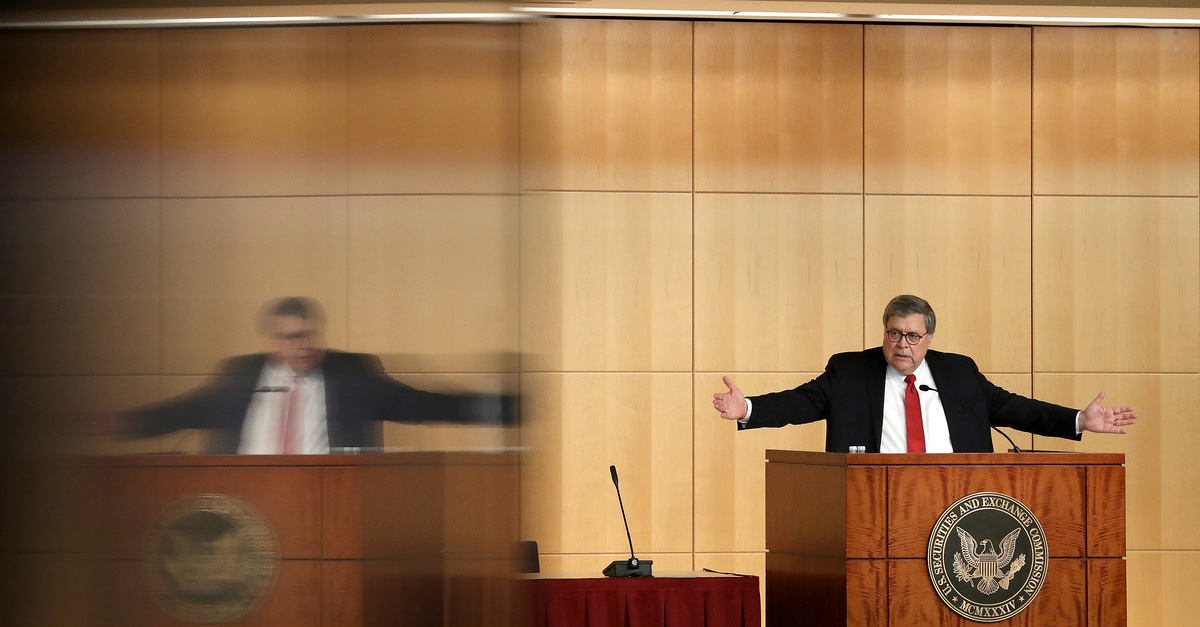
Attorney General Bill Barr set off alarm bells across the legal community early on Tuesday when it was reported that U.S. Attorney John Durham was promoted to the position of special counsel for the U.S. Department of Justice (DOJ) in late October of this year.
But legal experts quickly pointed out a few holes.
“Following consultation with Mr. Durham, I have determined that, in light of the extraordinary circumstances relating to these matters, the public interest warrants Mr. Durham continuing this investigation pursuant to the powers and independence afforded by the Special Counsel regulations,” the 77th and 85th attorney general wrote in his Order No. 4878-2020.
Dated October 19, 2020, Barr disclosed the order and appointment in a letter to the chairs and ranking members of the U.S. House and Senate intelligence committees sent Tuesday.
The move signaled that Barr’s DOJ was not yet finished investigating the investigation into Russian-based electoral interference in the 2016 election and alleged obstruction of justice–an investigation which was led by the nation’s last special counsel, Robert Mueller.
Some praised the alleged shrewdness of Barr’s decision because it will likely serve to hamstring the incoming Joe Biden administration by maintaining the probe into the probe while making it more difficult for the eventual 46th president to end Durham’s thus far mostly fruitless quest.
Former federal prosecutor Elizabeth de la Vega and other legal commentators were a bit less impressed.
“Barr hasn’t pulled off any brilliant move,” she tweeted. “The AG doesn’t have to remove Durham. Durham will need approval from the AG for any significant steps. The AG will decide the propriety of proposed acts by applying the law to the facts. GOP will cry political bias regardless. So what?”
De la Vega also pointed out that Barr’s order was not “in accordance with” one of the major federal regulations governing the appointment of special counsels.
“He couldn’t have because a special counsel must come from outside the government,” she noted, before citing the language from the letter to congressional leadership. “Barr appointed Durham ‘with the powers and authority of a Special Counsel.’ That’s not a thing.”
The regulation on point here is 28 C.F.R. § 600.3(a) and reads, in full [emphasis added]:
An individual named as Special Counsel shall be a lawyer with a reputation for integrity and impartial decisionmaking, and with appropriate experience to ensure both that the investigation will be conducted ably, expeditiously and thoroughly, and that investigative and prosecutorial decisions will be supported by an informed understanding of the criminal law and Department of Justice policies. The Special Counsel shall be selected from outside the United States Government. Special Counsels shall agree that their responsibilities as Special Counsel shall take first precedence in their professional lives, and that it may be necessary to devote their full time to the investigation, depending on its complexity and the stage of the investigation.
Other lawyers pointed to this as well.
The Durham appointment order notably completely ignored 28 C.F.R. § 600.3. It only asserted that the following regulations were applicable (which is what Mueller’s appointment order said):
But Mueller, a former FBI director, was working outside of government at the WilmerHale law firm at the time of his appointment.
The grounds for appointing a special counsel also emphasizes the outside of government nature of the position [emphasis ours]:
§ 600.1 Grounds for appointing a Special Counsel.The Attorney General, or in cases in which the Attorney General is recused, the Acting Attorney General, will appoint a Special Counsel when he or she determines that criminal investigation of a person or matter is warranted and -(a) That investigation or prosecution of that person or matter by a United States Attorney’s Office or litigating Division of the Department of Justice would present a conflict of interest for the Department or other extraordinary circumstances; and(b) That under the circumstances, it would be in the public interest to appoint an outside Special Counsel to assume responsibility for the matter.
Durham, of course, is a product of the United States government. He currently serves as the U.S. Attorney for Connecticut. Prior to that, he was Acting U.S. Attorney for the Eastern District of Virginia. Prior to that, he was an Assistant U.S. Attorney in Connecticut. Prior to that, he worked as a state prosecutor in Connecticut. And, Durham notably served as the U.S. government’s lead man who whitewashed the Central Intelligence Agency’s (CIA) destruction of its own torture records and then went on to whitewash the CIA’s entire torture program in two different special investigatory roles.
University of Texas Law Professor Steve Vladeck noted via Twitter that Durham’s appointment, though inconsistent “with the DOJ’s own regulation” doesn’t mean that Durham doesn’t have the title of special counsel. Rather, he explained, “that just makes the appointment (1) vulnerable to legal challenge; and (2) likely easier for a future AG to rescind.”
Importantly, the Durham appointment was not technically made under the auspices of the special counsel regulations (agency rules) but instead “by virtue of the authority vested in the Attorney General” under federal statutory (congressionally-passed laws) authority. Barr’s order goes on to apply several special counsel regulations to the Durham appointment–but not the special counsel regulation which mandates the person come from “outside government.”
Benjamin Wittes, the editor-in-chief of the legal blog Lawfare, explained the upshot:
In other other words, since Barr essentially did an end-run around the special counsel regulations, the Durham appointment is on shaky footing when and if the next attorney general decides the Quis custodiet ipsos custodes? investigation has finally run its course.
[image via Chip Somodevilla/Getty Images]